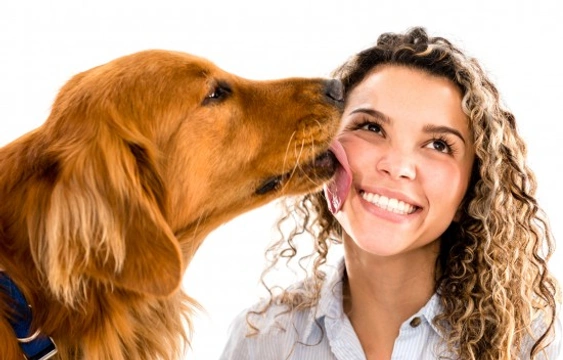
Dogs and licking - How to stop your dog from licking you
Licking is a natural canine behaviour, and can be used to show affection, beg for food, and clean themselves and the people or other animals that they live with. It can also be used to show submission to an alpha dog or person, or to get your attention. While it can be nice to have your dog show you affection in this way, licking can also be problematic: the mouths of dogs are not clean places, and licking transfers a whole host of bacteria, germs and other nasties onto the subject of the dog’s attention!
Dogs should never be allowed to lick your face, or lick your hands excessively, but with some dogs, this seems to be their main source of entertainment! If your dog’s licking is getting out of hand and you want to reduce their propensity to kiss you and other people, read on for our advice on how to stop your dog from licking people.
Tips and tricks to manage and reduce licking
It is important to start as you mean to go on, and if you own a puppy or a young dog, teach them from an early age that licking is not desirable behaviour, in the same way that jumping up is undesirable. It is always hard when dealing with a puppy to be firm and lay down the foundations for their future training and good behaviour, but it is vitally important to do so!
Don’t punish your dog for licking
Because licking can be a submissive behaviour, punishing or shouting at your dog for licking you can actually serve to make the problem worse. Licking can be used by dogs as a form of apology, so if you tell them off for licking, they may well instinctively seek to lick you again to say sorry for the thing that annoyed you!
Keep greeting and departing calm and not overenthusiastic
One of the times when your dog is most likely to lick and slobber all over you is when they are excited and keen to show affection, such as when you return home after a period away. Dogs usually show a significant degree of exuberance upon greeting their favourite people, such as barking, jumping up, wagging their tails and licking, and making a huge fuss of your dog seeks to reinforce and enable this behaviour. Understandably, you will be pleased to see your dog in the same way that they are pleased to see you, and you should not tell your dog off for being delighted that you are home; but try to keep things calm, do not overexcite your dog, and do not reward licking with lavish praise.
Ignore your dog when he licks you
If your dog approaches you and begins to lick you, do not tell them off; but move out of their reach, or hold their collar away from you until they stop. “No” is an effective command to use along with this, and while you should say “no” firmly, you should not make a big deal of it or make your voice sound annoyed or overly assertive. Keep following this procedure until your dog desists, and either backs off or stays with you but keeps their tongue to themselves!
Demonstrate affection by touch
It is important to make your dog feel loved and valued, and to spend enough time grooming, patting and playing with them so that they do not feel that they need to seek out attention and affection by licking. When your dog is calm and not attempting to lick you, spend plenty of time patting and praising them and generally reinforcing your bond and making your dog feel secure and valued.
Offer alternatives
Some dogs, particularly retrieving breeds, are very “mouthy” and are only happy when their mouths are active; eating, holding a ball, or licking. If this is the case with your dog, offer them an alternative to licking, such as presenting them with a toy or a stuffed Kong to occupy their mouths when they are seeking something to do! Make sure, however, that you do not end up inadvertently teaching your dog that licking gains a reward, and so reinforces their idea that licking is a good way of asking for things.
Food rewards
As when training your dog to learn any new skill or desist from any undesirable behaviour, positive reinforcement training with a food reward can go a long way towards driving the message home to your dog! Keep treats handy, and when your dog tries to lick you, say “no” and then reward them with a treat when your dog complies. If your dog is prone to licking particularly when offered a treat, withhold the treat until your dog approaches without trying to lick you. In time, your dog should learn to keep their tongue to themselves!



